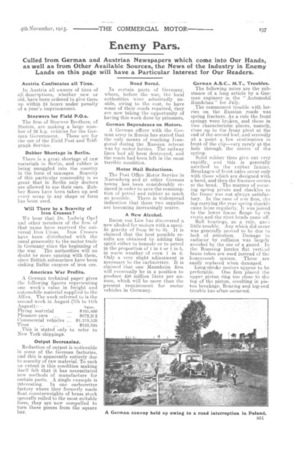Enemy Pars.
Page 17

If you've noticed an error in this article please click here to report it so we can fix it.
Culled from German and Austrian Newspapers which come into Our Hands, as well as from Other Available Sources, the News of the Industry in Enemy Lands on this page will have a Particular Interest for Our Readers.
Austria Confiscates all Tires.
In Austria all owners of tires of all descriptions, whether new or old, have been ordered to give them up within 24 hours under penalty of a year's imprisonment,.
Stoewers for Field P.O.s.
The firm of Stoewer Brothers, of Stettin, are making a large number of 32 h.p. vehicles for the German Government. These are for the use of the Field Post and Telegraph Service.
Rubber Shortage in Berlin.
There is a great shortage of raw materials in Berlin, and rubber is being • smuggled into the country in the form of sausages. .Scarcity of this particular commodity is so great that in Berlin only doctors are allowed to use their cars. Rubber floors have been taken up and every scrap in any shape or form has been used.
Will There be a Scarcity of Iron Crosses"? We hear that Dr. Ludwig Opel and other members of the firm of that name have received the uni versal Iron Cross. Iron Crosses have been distributed with the usual generosity to the motor trade in Germany since the beginning of the war. The authorities will no doubt be more sparing with them, since British submarines have been sinking Baltic cargoes of iron ore.
American War Profits.
A German technical paper gives the following figures representing one week's value in freight and automobi1e. material supplied to the Allies. The week referred to is the second week in August (7th to 14th August) Flying material ... /PIC/5,S00 Pleasure cars $672,2f2 Commercial vehicles ... $1,319,539 Tires $242,895 This is stated only to refer to New York shippings.
Output Decreasin g.
Reduction of output is noticeable in some of the German factories, and this is apparently entirely due to scarcity of raw material. To such an extent is this condition making itself felt that it has necessitated new methods of manufacture for certain parts. A single example is interesting. In one carburetter factory where they formerly made float counterweights of brass stock specially rolled to the most suitable form, they are now compelled to turn these pieces from the square bar. Road Bored.
In certain parts of Germany, where, before the war, the local authorities were admittedly unable, owing to the cost, to have some of their roads repaired, they are now taking the opportunity of having this work done by prisoners.
German Dependence on Motors.
A German officer with the German army in Russia has stated that the only means of reaching Ivangored during the Russian retreat was by motor lorries. The railway lines had all been destroyed, and the roads had been left in the most terrible condition.
Motor Mail Reductions.
The Post Office Motor Service in Nuremberg and at other German towns has been considerably reduced in order to save the consumption of petrol and rubber as much as possible. There is widespread indication that these two supplies are becoming increasingly scarce.
A New Alcohol.
Baron von Low has discovered a new alcohol for motors with a specific gravity of from 90 to 95. It is claimed that the best possible results are obtained by adding this spirit either to benzole or to petrol in the proportion of 1 in 4 or 1 in 5, in warm weather of even 1 in 6. Only a very slight adjustment is necessary to the carburetter. It is claimed that one ..Mannheim firm will eventually be in a position to produce 450 million litres per annum, which will be more than the present requirement for motor vehicles in Germany. German A.S.C.. M.T. Troubles.
The following notes are the substance of a long article by a German engineer in the " Automobil Rundchau" for July.
The commonest trouble with lorries on the Russian roads was spring fracture. As a rule the front springs were broken, and these in two characteristic places, namely, close up to the front pivot at the end of the second leaf, and secondly at a point a few centimetres in front of the clip—very rarely at the hole through the centre of the spring.
Solid rubber tires give out very rapidly, and this is generally ascribed to the rubber famine. Breakages of front axles occur only with those which are designed with a bend, and then the fracture occurs at the bend. The manner of securing spring pivots and shackles to the frame was not always satisfactory. In the ease of One firm, the lug carrying the rear spring -shackle came loose regularly. It was joined to the lower frame flange by six rivets and the rivet heads came off.
Ball bearings, as a rule, gavo little trouble. Any which did occur was generally proved to be due to lack of attention. Damage to radiator by collision was largely avoided by the use of a guard. In the Buessing lorries flat vertical brass tubes are used instead of the honeycomb system. These are easily replaced when damaged.
Long-stroke motors appear to be preferable. One firm placed the upper piston ring too close to the i top of the piston, resulting n piston breakage. Bearing and big-end trouble has often occurred.




















